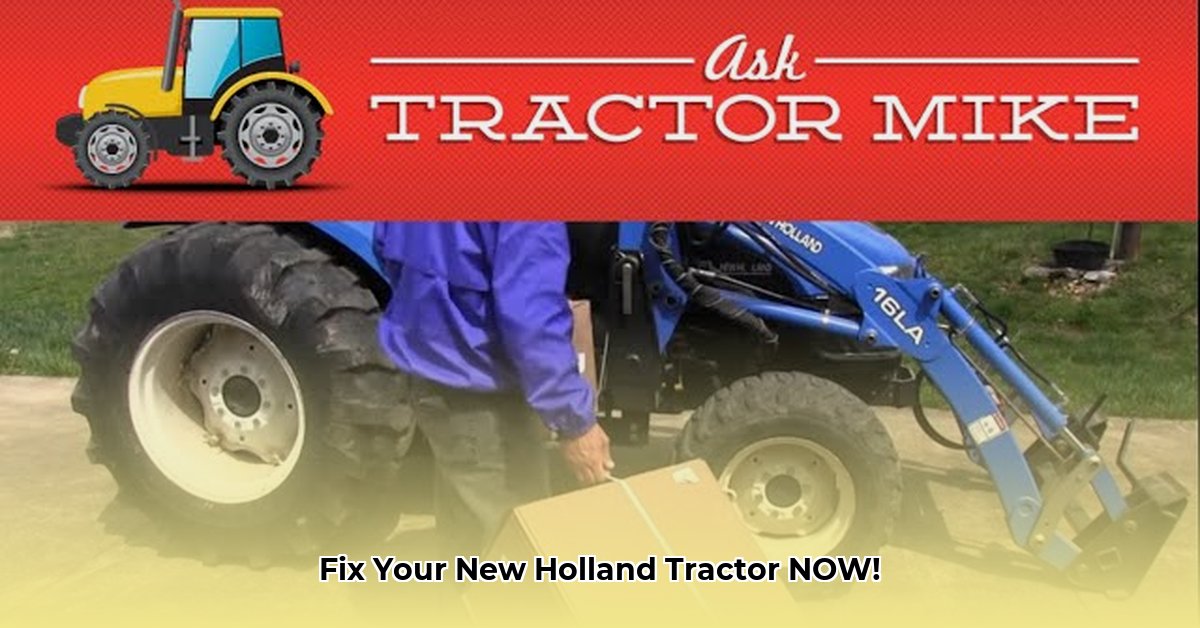
New Holland T4.75 Tractor Troubleshooting and Maintenance
The New Holland T4.75 is a popular choice for smaller farms, known for its reliability and versatility. However, even the most robust machinery requires regular maintenance and occasional repairs. This guide provides practical, step-by-step instructions to help you diagnose and resolve common problems, maximizing your tractor's lifespan and minimizing downtime. For more detailed information on New Holland tractors, check out this helpful resource: New Holland Parts.
Understanding Common T4.75 Issues
Many problems stem from the tractor's core systems: electrical, hydraulic, and fuel. Ignoring minor issues can lead to major repairs. Regular inspections are crucial. Isn't preventing costly repairs better than facing them?
Electrical System Problems
Faulty wiring, blown fuses, and corroded connectors are common culprits. Symptoms range from flickering lights to complete electrical failure. A simple visual inspection can often pinpoint the problem. Before any work, always disconnect the battery's negative terminal – safety is paramount.
- Visual Inspection: Carefully examine all wiring, connectors, and fuses for damage.
- Testing: Use a multimeter (a device that measures electrical current) to test circuits.
- Repair/Replacement: Repair or replace damaged wiring, tighten loose connections, and replace blown fuses. Consult a mechanic for complex issues.
Hydraulic System Leaks
Hydraulic leaks reduce efficiency and can cause serious damage if ignored. Regular fluid level checks are essential. A slow leak might seem insignificant, but it can quickly escalate into a costly problem.
- Leak Location: Inspect all hydraulic hoses, cylinders, and fittings for leaks. Use a clean cloth to help spot leaks.
- Source Identification: Determine if the leak originates from a cracked hose, worn seal, or loose fitting.
- Repair/Replacement: Tighten loose fittings. For cracked hoses or worn seals, replacement is necessary. Seek professional help if unsure.
Fuel and Air Filter Fouling
Clogged filters restrict fuel and air flow, impacting performance and potentially damaging the engine. Regular filter replacement is a simple, cost-effective preventative measure. A clean fuel filter increases efficiency and reduces engine wear.
- Filter Access: Locate filters (consult your owner's manual).
- Replacement: Carefully remove old filters and install new ones, following the manufacturer's instructions.
- Frequency: Replace filters according to the recommended schedule (typically every 250 operating hours).
Preventative Maintenance: A Proactive Approach
Regular preventative maintenance significantly extends the life of your T4.75. A small investment in time and resources now can prevent costly repairs later. How often do you conduct preventative maintenance checks?
Remember, regular maintenance is an investment that yields returns in long-term reliability and reduced repair costs. Here's a sample maintenance schedule:
| Component | Maintenance Task | Frequency |
|---|---|---|
| Electrical System | Inspect wiring, connectors, and fuses | Monthly |
| Hydraulic System | Check fluid levels and for leaks | Weekly |
| Fuel/Air Filters | Inspect and replace as needed | Every 250 hours |
| Engine Oil | Change oil and filter | Every 500 hours |
| Transmission Fluid | Check fluid levels | Monthly |
Parts Sourcing and Long-Term Planning
New Holland dealerships are the primary source for genuine parts, ensuring compatibility and quality. Aftermarket parts can offer cost savings, but always verify they meet specifications. What's your preferred method for obtaining parts?
Consider the total cost of ownership (TCO), including maintenance, repairs, and fuel. Regular maintenance extends the tractor's lifespan, reducing long-term costs and environmental impact.
Conclusion: Maximize Uptime, Minimize Expenses
By following this guide's recommendations, you'll significantly improve your T4.75's reliability and minimize downtime. Remember, regular maintenance is key to long-term, cost-effective farming operations. Prioritizing preventative maintenance is a smart investment in your farm's success.